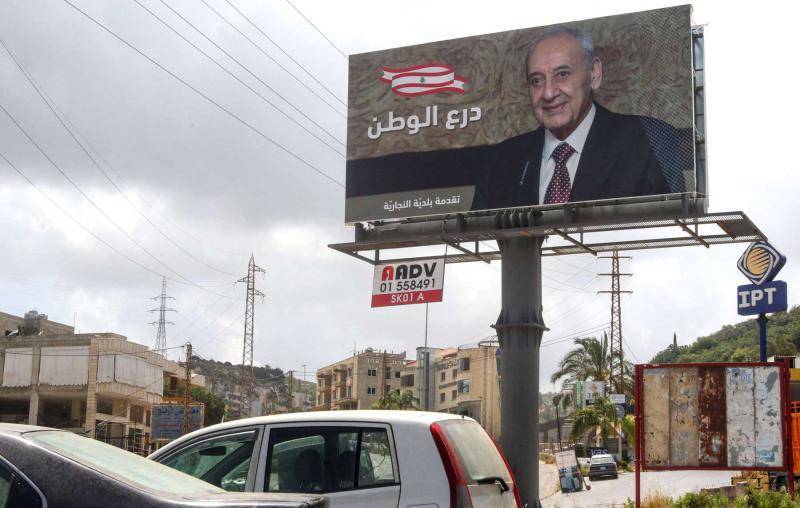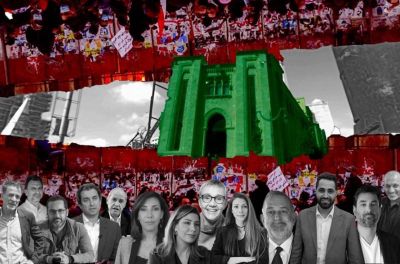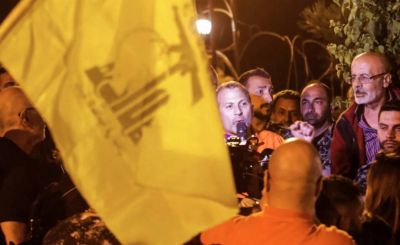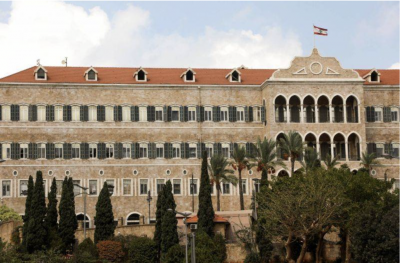
ampaign poster of Speaker of the House Nabih Berry in the city of Sour, May 5, 2022. (Credit: Mahmoud Zayyat/AFP)
On May 31, 2022, the newly elected Parliament, formed just 16 days prior, convened for the first time. Journalists, photographers, activists and observers gathered at the Place de l'Étoile to witness the entrance of the newcomers with great anticipation.
That day, the electoral breakthrough of the reformist forces and the diminishing influence of Hezbollah and its allies seemed to herald a new era of change for the country.
However, barely three hours later, the MPs exited the Parliament building in low-spirits.
The internal elections delivered a stinging blow: Nabih Berri was re-elected as Speaker, a position he has held for approximately three decades, while the political establishment’s representatives secured all crucial appointments.
Things became more clear. Despite some new cracks, the establishment maintained its grip and the 2022 elections did not fundamentally alter the situation.
While the elections did not bring about a seismic shift, they did shed light on four significant dynamics: the retreat of the pro-Hezbollah camp, which experienced a relative defeat and lost its majority; the setback of its ally, the Free Patriotic Movement (FPM) of former President Michel Aoun; the fragmentation of the Sunni landscape following the withdrawal of former Prime Minister Saad Hariri from political life; and lastly, the emergence of elected members affiliated with the protest movement.
However, one year later, it must be acknowledged that the changes on the political scene have had little impact on the political game. Despite being weakened, Hezbollah remains the dominant player.
Why is this the case? Why didn’t the election results have a major impact on the political scene? L’Orient-Le Jour assesses the situation.
Setback for the pro-Hezbollah camp
Following the May 2022 elections, the Hezbollah camp and its allies could not truly declare a sweeping victory, as they only secured 61 out of the 128 available seats.
It is worth noting that Amal and Hezbollah were successful in securing the crucial 27 seats designated for the Shiite community, unlike in previous elections. However, the overall tally for the political faction fell short of the 73 seats it won in the 2018 elections and the 65 seats required for a majority.
The opposition camp currently holds around 42 parliamentary seats, leaving the remaining 25 seats in a more centrist position.
It is partly due to these gray-area MPs that Hezbollah has managed to overcome the numerical disadvantage.
The Party of God possesses a skillful ability to manipulate the workings of the political system, persuading centrist MPs who seek to benefit from its support to align with its agenda.
In the internal parliamentary elections for instance, Hezbollah secured the election of its preferred candidates, including Berri as speaker and Elias Bou Saab as deputy speaker, thanks to the backing of these centrist MPs, just meeting the required 65 votes.
Although it was a narrow victory, it remains a victory nonetheless.
Similarly, during the binding parliamentary consultations to appoint a prime minister, the candidate supported by Amal and Hezbollah garnered the support of several centrist MPs, including Jamil Abboud, who is affiliated with Nehmat Frem, despite the fact that he was elected as part of the anti-Hezbollah camp.
Without a power majority and engaged in a direct conflict with its primary Christian ally, the FPM, Hezbollah finds itself more isolated on the political stage than ever before.
This isolation is evident in the party’s struggle to secure a majority of votes, let alone a quorum, in support of its presidential candidate Sleiman Frangieh.
But Hezbollah still holds a position of dominance, and it is currently the most adept at maneuvering within a rapidly changing political landscape. Its advantage primarily stems from the disunity among the opposing factions.
FPM in second place
Citing significant “differences of opinion,” FPM leader Gebran Bassil has so far opposed Frangieh’s election, particularly due to the strained relations between the two Christian leaders.
This is true despite the fact that Hezbollah had thrown all its weight behind the FPM during the election to prevent its defeat.
Both the Oct. 17, 2010, mass protests, and the August 2020 devastating Beirut port explosion had a significant impact on the FPM’s popularity. As a result, despite the backing of its Shiite ally, the party experienced a significant decrease in its political bloc, obtaining only 16 parliamentary seats. This outcome relegated them to second place among Christian political factions after more than 17 years of being at the forefront.
Meanwhile, the Lebanese Forces (LF), led by Samir Geagea, emerged as the largest opposition, securing 19 parliamentary seats.
However, as is frequently observed in Lebanon, numbers alone do not determine everything, and the LF have struggled to translate their legislative victory into substantial political gains.
The LF finds itself isolated, facing challenges due to its involvement in past militias and its participation in various governments since 2015. Some of the LF’s potential partners hold negative views of this history, and the party’s staunch anti-Hezbollah stance hampers its ability to form alliances across the political spectrum.
Meanwhile, despite his electoral setback, Bassil remains in a position of influence. More than eight months into the presidential election process, it appears that both Hezbollah and the opposition recognize his significance.
While it is impossible to elect Frangieh as president without Bassil’s endorsement, it is just as difficult for the opposing camp to put forward a candidate capable of rivaling the Zgharta strongman without his support too.
Although he appears open to potential agreements with either side, Bassil is clearly raising the stakes and asserting his position.
The Sunni split
The 2022 elections took place amidst an unprecedented context, marked by the absence of prominent Sunni leader Saad Hariri from the political scene.
The outcome of the vote confirmed the fragmentation of the Sunni landscape, as no alternative leadership emerged.
Surprisingly, the lack of Sunni leadership did not significantly benefit Hezbollah in terms of electoral gains. Out of the 27 seats allocated to the Sunni community in Parliament, nine are held by independents aligned with the March 8 camp (who are preparing to form a political bloc). Additionally, seven MPs oppose Hezbollah and the current power, while the remaining 11 members consist of former Hariri supporters or independents with ambiguous affiliations.
However, the independent Sunni MPs, fearing marginalization, often align themselves with the strongest faction and avoid direct confrontation. This behavior was evident in their reluctance to support the opposition presidential candidate, Michel Moawad. Consequently, Moawad’s support base has remained stagnant at around forty MPs throughout the eleven parliamentary electoral sessions conducted so far.
On the other hand, these MPs appear willing to vote in favor of Frangieh if a compromise is reached. They have received assurance from Saudi Ambassador to Lebanon Walid Bukhari that Saudi Arabia, the historical protector of their community, will not veto Frangieh’s candidacy.
Divided opposition forces
The May 2020 vote brought a surprising outcome with the election of 13 MPs aligned with the popular protest movement. However, their number has since decreased to 12 due to the Constitutional Council’s decision to replace Rami Fanj, MP for Tripoli, with Faysal Karameh, a pro-Hezbollah Sunni, following an invalidation appeal of Fanj’s election.
While these MPs initially held the promise of change for many Lebanese, internal divisions soon emerged, undermining the prevailing optimism. Cracks in their unity became evident during the election of Parliament’s deputy speaker, during which they failed to agree on a common candidate. Similarly, during the appointment of the prime minister, the 13 MPs split their votes between blank ballots and Nawaf Salam, unable to reach a consensus.
Some of the more “idealist” members among them refuse to align themselves with the traditional opposition, including the independents, the LF, and Kataeb.
For these MPs, known as representatives of the thawra (revolution), it is essential to remain faithful to the core slogan of the popular protest, “All of them means all of them,” even if it means becoming more isolated.
However, internal divisions have taken a toll on their unity. The bloc experienced a series of setbacks , leading to the departure of certain MPs like Waddah Sadek and Michel Doueihi.
Their inability to agree on a coherent strategy for the presidential election is significantly undermining their credibility, with some of them changing their preferred candidates every week. This plays in favor of the ruling class.
This article was originally published in French in L'Orient-Le Jour. Translation by Sahar Ghoussoub.


